6 Fascinating Facts About Whole Foods’ 365 Brand
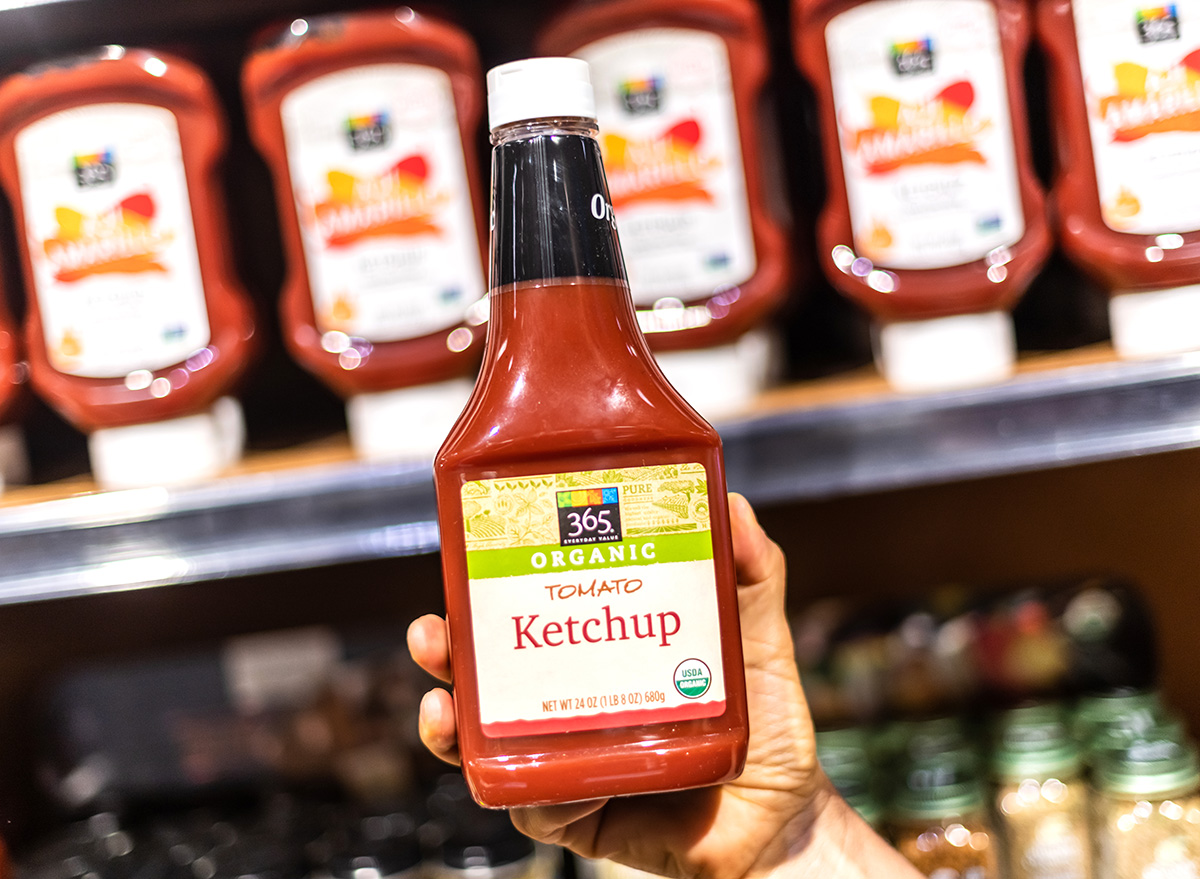
If you’ve noticed more store brands on grocery store shelves lately, you’re not alone. While some shoppers are fiercely loyal to name-brand products that can be found in most grocery stores, the popularity of house brands—or, what the industry calls “private labels”—is steadily growing. In fact, house brands are even outperforming some national brands at certain grocery stores, and have seen double-digit growth in sales just in the past year, according to Supermarket News.
The recent spotlight on private labels shone even brighter this month when popular grocer Whole Foods Market announced that products under its house brand, 365, would be available to online shoppers nationwide via Amazon.
“Prior to this launch, Prime members were able to order 365 products for grocery delivery through Whole Foods Market on Amazon or Amazon Fresh, but the service was not available nationwide,” says Rachel Bukowski, the team leader of product development at Whole Foods. “In May, we began adding more 365 products to Amazon.com for nationwide delivery in all 50 states–shipped free with Prime. Today we have more than 600 products available.”
Amazon purchased Whole Foods for $13.7 billion in 2017, which led to many changes in how the Texas-based grocery chain operates.
A perk of buying 365 items online versus in the store is that shoppers can receive a discount when they buy recurring orders. Customers who want to receive a weekly supply of certain products can receive up to a 15% discount on them, according to Bukowski.
The online launch is just the latest expansion of the 365 brand, which Whole Foods first introduced in 1997. The retailer now offers more than 3,000 products under this label, which provides a lower-cost alternative to the more expensive items typically found on its shelves. Whole Foods’ reputation for hefty prices contributed to its popular nickname, “Whole Paycheck”—a distinction that the rise of 365 may help to allay.
If you’re a Whole Foods shopper, then you probably already purchase plenty of 365 products. But, how much do you really know about the company’s house brand? Here are several things that even the most ardent Whole Foods fans might not know about 365.
The brand is named for the company’s beliefs
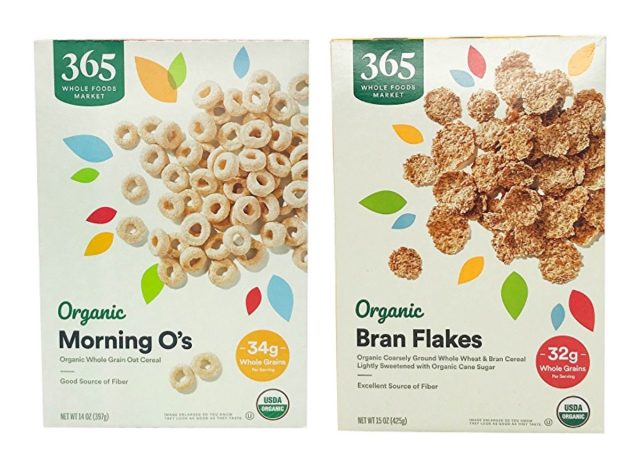
Most shoppers could assume that the name 365 stood for the amount of days in a year, and they’d be sort of right, but not entirely. The name is actually derived from Whole Foods’ desire to provide fresh food every day of the year—no matter what season it is.
“The name is meant to be a signal that shoppers can find fresh and healthy foods at prices every day of the year that won’t break the bank,” says Julie Ramhold, a consumer analyst with DealNews.com
Those beliefs are echoed on the company’s website, in which the company says that one of its main values is selling high quality natural and organic foods to its customers.
The brand’s manufacturers are kept secret
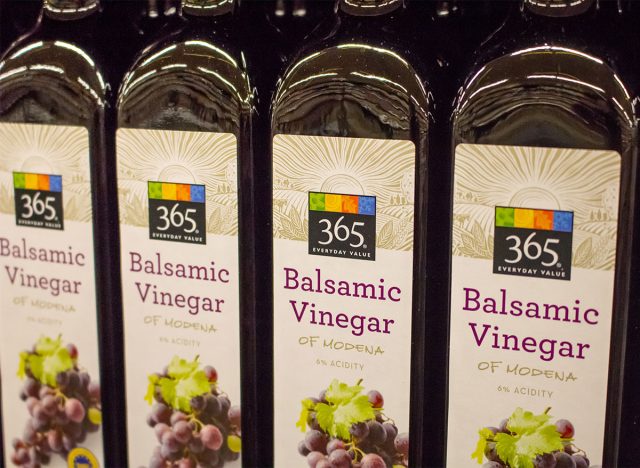
When you purchase private label products at certain grocery stores, you might think that you’re finding a unique product, made just for that store. For the most part, that’s not the case.
Oftentimes, a name-brand supplier actually makes these products. The items just have a different label. Take Costco, for example. Its Kirkland Signature coffee is actually supplied by Starbucks, and its house-brand frozen cheese pizza reportedly comes from Palermo’s. While some sleuthy shoppers have figured out which name brands are hiding behind the house-brand packaging, it’s nearly impossible to find that information out when it comes to 365 products.
“Manufacturers are kept under lock and key,” says Ramhold. “Whole Foods utilizes outside manufacturers for their 365 line of products, but they protect the information of exactly which brands are responsible for these products.”
The brand’s Greek yogurt came loaded with legal drama
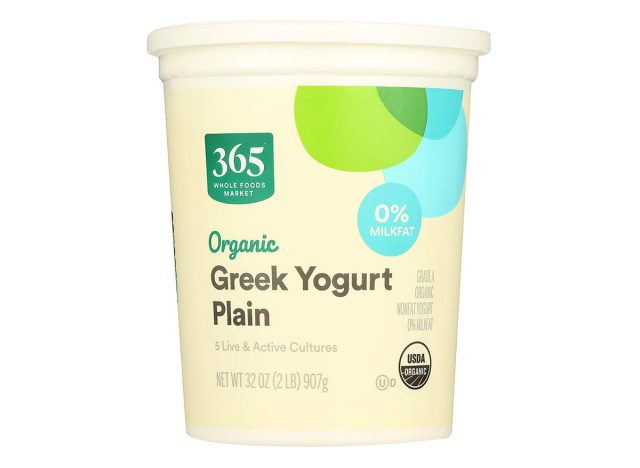
Whole Foods’ 365 Greek yogurt originally purported to be an outlier in the marketplace. Most Greek yogurts contain between five to 10 grams of sugar per serving, while packages of the 365 version originally claimed to contain only two grams. An investigation by Consumer Reports, however, suggested this was untrue. Testing by the consumer watchdog group indicated that 365 Greek yogurt actually contained more than five times as much sugar as its label indicated. A lawsuit was filed against the grocery chain in 2014.
“Consumer Reports discovered that the 365 plain nonfat Greek yogurt contained an average of 11.4g of sugar per serving, despite the fact that the label claimed to only have 2g,” Ramhold says. “This resulted in a class-action lawsuit and the product was pulled from shelves while the investigation was conducted.”
A judge threw out the lawsuit in 2016, because the plaintiffs relied on the data supplied by Consumer Reports, which did not meet Food and Drug Administration (FDA) criteria for testing. The FDA requires 12 units to be tested from 12 batches, but the Consumer Reports data only tested six units from six batches.
There used to be separate 365 stores
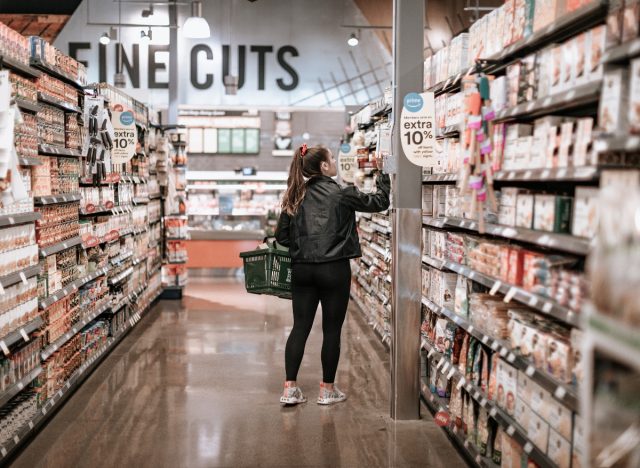
Nowadays, hundreds of 365 products are found at every Whole Foods location, but just a few years ago shoppers could go to separate stores which sold 365 products exclusively. In 2015, the retailer opened 365 by Whole Foods, which ultimately grew to nine locations across the country. The stores were smaller, more affordable versions of Whole Foods, and even came equipped with juice bars, in-store restaurants, and grab-and-go sections.
“They stopped operating in 2019, when Whole Foods closed all of the 365 stores and converted some to regular Whole Foods stores,” Ramhold says. “They seemingly stopped having these stores devoted wholly to the 365 line because the concept was unsuccessful compared to the regular Whole Foods stores.”
The brand got sued over its soaps
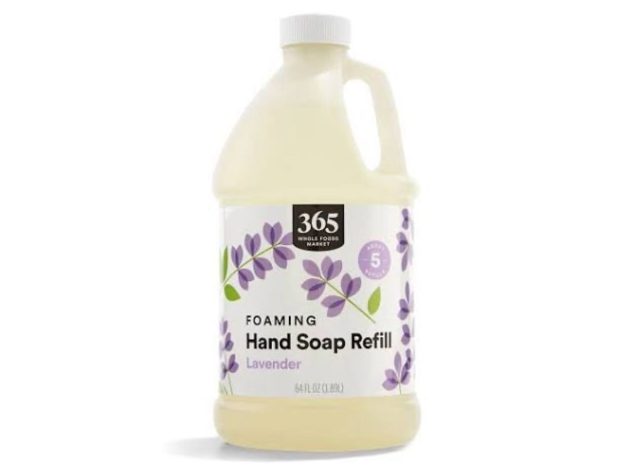
Carcinogens can be found in asbestos, ultraviolet rays, and tobacco smoke, and in 2008, a cancer-causing chemical was also allegedly found in 365’s soap. Whole Foods was one of four manufacturers sued by the State of California, accusing the retailer of failing to label soap products that potentially contain a carcinogen.
“In 2008, soaps under the 365 brand were found to apparently contain a carcinogen, which resulted in the state of California suing Whole Foods,” Ramhold says.
That’s not the only time that Whole Foods has had to recall something due to possible links to cancer—in 2018 the grocery chain also removed packaging from the store that contained polyfluoroalkyl substances (PFAS), which have been linked to higher chances of several types of cancers.
The 365 peanut butter is a fan favorite
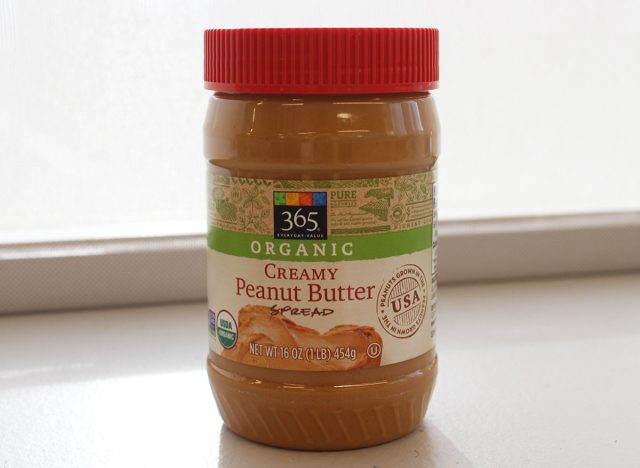
Most of the time, when you look at the ingredients on food labels at the grocery store, there’s a slew of ingredients that are unpronounceable. The 365 peanut butter at Whole Foods, on the other hand, has just one ingredient—dry roasted peanuts. That simplicity, along with the peanut butter’s lower cost, make it one of the store’s best-selling items.
“Whole Foods has a few different kinds of peanut butter, so it’s important to look for the creamy peanut butter with a green lid, as it only includes dry-roasted peanuts,” Ramhold says. “There are other organic and non-organic peanut butters under the 365 label, so if you’re worried about sugar or anything like that, take your time shopping to make sure you get this product with the simplest ingredients.”
Ramhold says that the store’s peanut butter is one of its top-selling products, along with the store’s house-brand ice cream. Some Whole Foods customers have taken to social media to proclaim their love for the popular product. “Can’t walk past it without buying more,” one shopper wrote on Reddit.









